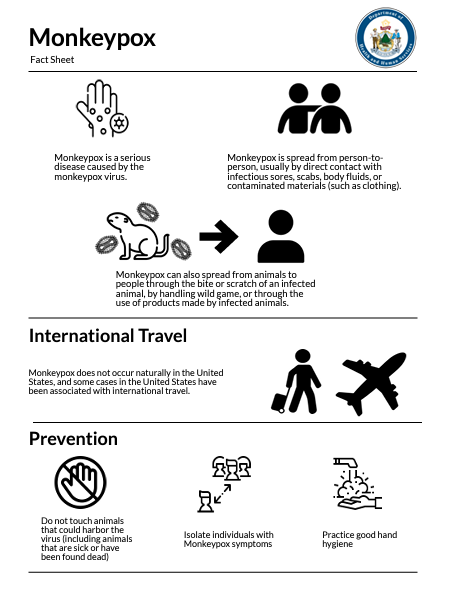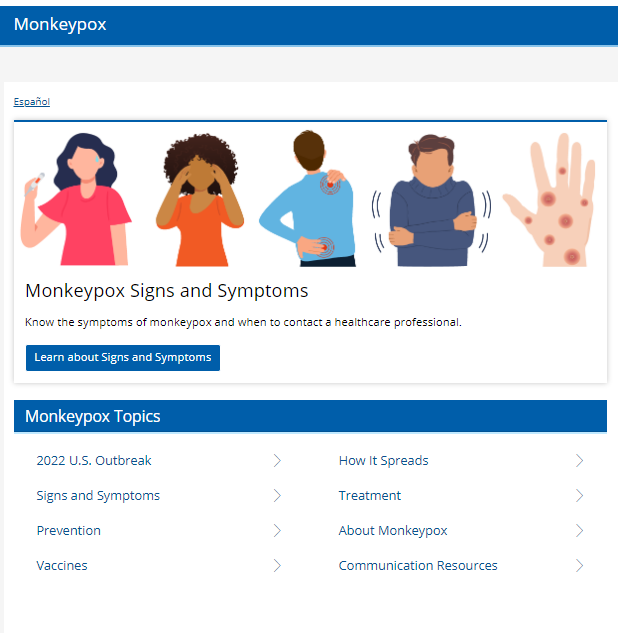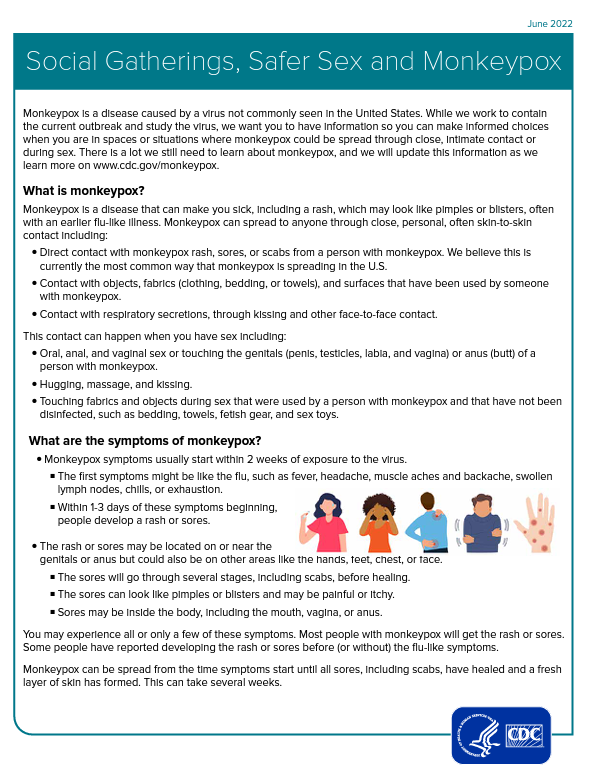DHHS → MeCDC → Disease Surveillance → Epidemiology → Zoonotic →Monkeypox
Mpox
Quick Links to Mpox Information
Mpox Resources
About Mpox
Mpox is a rare disease that is caused by infection with mpox virus. Mpox belongs to the same gruop of viruses that includes smallpox and cowpox. Mpox cases in humans in the U.S. have been linked to international travel as well as imported animals.
Symptoms
Mpox symptoms can include:

Fever and chills

Headache

Muscle aches and backache

Swollen lymph nodes

Exhaustion
Mpox also includes a rash that can look like pimples or blisters that appears on the face, inside the mouth, and on other parts of the body, like the hands, feet, chest, genitals, or anus. See examples of mpox rash here.
The rash goes through different stages before healing completely. The illness typically lasts 2-4 weeks. Sometimes, people get a rash first, followed by other symptoms. Others only experience the rash.
Spread
Mpox virus can spread:
- When a person comes in contact with an infected animal
- Through direct contact with body fluid or sores of an infected person
- Through direct contact with contaminated materials, such as clothing or bedding
- Through respiratory droplets during prolonged face-to-face contact with an infected person
What Should I Do If I Have Mpox?
Talk to a healthcare provider if you think you have mpox. Mpox can occur at the same time as other infections, like sexually transmitted infections. This includes gonorrhea, syphilis, chlamydia, and HIV. You healthcare provider may also test and treat you for other infections.
How do I Isolate?
If you have mpox or mpox symptoms, isolate at home away from others.

- Isolate until your rash is fully healed (scabs fallen off and a fresh layer of skin forms).
- Wash your hands frequently with soap and warm water.

- Stay in a separate room or area from other household members and pets.
- Limit using shared household areas as much as possible.
- Do not have visitors in your home during isolation.

Avoid close contact with other people in your home.
Avoid close contact with pets in your home.
Close contact is being within 6 feet of someone with mpox.

Avoid sharing items with other people in your home that could become contaminated (bedding, clothing, towels and wash cloths, drinking glasses, eating utensils, and others).
Use coversheets, waterproof mattress covers, blankets, or tarps over any surface that cannot be washed (like upholstered furniture or porous surfaces).

You can leave your home and sick room for emergency or necessary medical care.
If you need to leave your home during isolation, cover any skin rash with bandages, long pants and long sleeves, or dress. Also wear a well-fitting mask.

Use a separate bathroom from others in your home, if possible.
If not possible, clean and disinfect surfaces (counters, toilet seats, faucets) with an EPA-registered cleaning product after using.
For more information about mpox isolation, visit Isolation and Prevention Practices for People with Mpox.
Contact a healthcare provider right away if:
- You have blood in your urine.
- You have difficulty urinating.
- You are unable to retract your foreskin.
- Your foreskin cannot return to a normal position after being retracted.
- You are unable to pass a bowel movement.
- You have blood in your stool.
- You develop diarrhea.
- You have pain that you cannot manage at home.
Mpox Vaccine
- You had known or suspected exposure to someone with mpox
- You had a sex partner in the past 2 weeks who was diagnosed with mpox
- You are a gay, bisexual, or other man who has sex with men or a transgender, nonbinary, or gender-diverse person who in the past 6 months has had any of the following:
- A new diagnosis of one or more sexually transmitted diseases (e.g., chlamydia, gonorrhea, or syphilis)
- More than one sex partner
- You have had any of the following in the past 6 months:
- Sex at a commercial sex venue (like a sex club or bathhouse)
- Sex related to a large commercial event or in a geographic area (city or county for example) where mpox virus transmission is occurring
- Sex in exchange for money or other items
- You have a sex partner with any of the above risks
- You anticipate experiencing any of the above scenarios
- You have HIV or other causes of immune suppression and have had recent or anticipate future risk of mpox exposure from any of the above scenarios
- You work in settings where you may be exposed to mpox:
- You work with orthopoxviruses in a laboratory
U.S. CDC recommends vaccination against mpox if:
If you think you meet these criteria, contact one of the sites in the table below.
| Mpox Vaccine Locations in Maine | |||
|---|---|---|---|
| County | Healthcare Provider | Address | Phone Number to Schedule |
| Cumberland | City of Portland STD Clinic | 39 Forest Ave, Portland, ME 04101 | (207) 756-8067 |
| Cumberland | Intermed Internal Medicine | 84 Marginal Way, Suite 800, Portland, ME 04101 | (207) 523-8595 |
| Cumberland | Intermed Yarmouth Family Practice | 259 Main Street, Yarmouth, ME 04096 | (207) 846-9013 |
| Cumberland | Portland Public Health | 39 Forest Ave, Portland, ME 04101 | (207) 874-8446 |
| Penobscot | Northern Light Pharmacy - Westgate | 917 Union Street, Suite 7, Bangor, ME 04401 | (207) 973-6788 Appointments available Mondays. Schedule your appointment here |
To be fully vaccinated for mpox, you need to receive two vaccine doses about four weeks apart. You are considered fully vaccinated 14 days after your second vaccine. You will receive instructions on how to schedule your second vaccine appointment when you get your first shot.
Mpox Symptom Relief
- Drink plenty of water and other clear fluids to prevent dehydration.
- Keep sores clean and dry when you are not showering or bathing.
- Your healthcare provider may talk to you about using these steps based on your symptoms:
- Itching
- Use over-the-counter oral antihistamines (like diphenhydramine/Benedryl, cetirizine, or hydroxyzine).
- Use topical ointments like calamine lotion or petroleum jelly (Vaseline, etc.)
- Mouth pain or sores
- Use prescription mouthwash. This helps mouth pain and keeps sores clean.
- Use topical over-the-counter oral gels to reduce pain (like Orajel). Talk to your healthcare provider about how much to use.
- Sores in the genital or anal regions
- Use warm sitz baths.
- Use topical pain-relief gels or creams (like RectiCare) to provide temporary relief.
- Proctitis (swelling of the lining of the rectum internal to the anus)
- Use stool softeners like docusate and warm sitz baths.
- Use over-the-counter pain medications like acetopminophen.
- Your healthcare provider may prescribe other pain medications. Discuss side effects with them before taking any other medications.
- Nausea and/or vomiting
- Talk to your healthcare provider about prescription medications to control nausea.
- Diarrhea
- Drink plenty of water and fluids with electrolytes to stay hydrated.
- Over-the-counter medications are not recommended.
- Bacterial infections
- Talk to your healthcare provider about if and when you may need antibiotics.
Ways to Make Yourself More Comfortable If You Have Mpox Symptoms:
Mpox Treatment in Maine
- People who are hospitalized for severe mpox symptoms
- People who have a weakened immune system
- People with certain skin conditions
- People who are pregnant or breastfeeding
- People with certain complications
Many people with mpox have mild symptoms. Most people with mpox fully recover within 2 to 4 weeks.
Mpox treatment includes supportive care to manage symptoms like pain and rashes. There is also an antiviral medication called tecovirimat (TPOXX). This mediation was originally developed to treat smallpox and may help to treat mpox, since the viruses that cause mpox and smallpox are similar. For patients at high risk for severe disease, use TPOXX early in the course of illness along with supportive care and pain control.
People who are more likely to get severely ill include:
If you have symptoms, talk to your healthcare provider. They may want to test you, even if you do not remember having contact with someone with mpox.
If you have mpox, ask your healthcare provider if mpox treatment is right for you. The preferred method for obtaining TPOXX is through remote enrollment in the Study of Tecovirimat for Human Mpox Virus (STOMP).
If you are unable or prefer not to enroll in STOMP, these locations have TPOXX available. Please contact the facility beforehand to find out how to get care and/or treatment at that location.
| Locations with TPOXX | |||
|---|---|---|---|
| County | Healthcare Provider | Address | Phone Number to Schedule |
| Androscoggin | Walgreens | 430 Sabattus St., Lewiston | 207-783-2013 |
| Cumberland | Northern Light Mercy Hospital | 175 Fore River Parkway, Portland | 207-879-3000 |
| Cumberland | Walgreens | 127 Marginal Way, Portland | 207-771-5631 |
| Hancock | Northern Light Blue Hill Hospital | 57 Water St., Blue Hill | 207-374-3400 |
| Hancock | Walgreens | 226 High St., Ellsworth | 207-664-0952 |
| Hancock | Maine Coast Hospital | 50 Union St, Ellsworth, ME 04605 | 207-664-5311 |
| Kennebec | MaineGeneral Medical Center | 35 Medical Center Parkway, Augusta | 207-626-1000 |
| Penobscot | Northern Light Pharmacy - State Street | 210 State St., Suite 201, Bangor | 207-947-8369 |
| Penobscot | St. Joseph Hospital, Bangor | 360 Broadway, Bangor | 207-907-1000 |
| Piscataquis | Northern Light CA Dean Hospital | 364 Pritham Ave. Greenville Junction | 207-695-5200 |
| Piscataquis | Northern Light Mayo Hospital | 897 W. Maine St., Dover-Foxcroft | 207-564-8401 |
| York | Walgreens | 400 US Route 1, York | 207-363-4312 |
For healthcare providers who would like to prescribe TPOXX, visit the clinician information page for more information about prescribing this medication.
Information for Healthcare Providers
More information for healthcare providers is available on the Clinician Information Page.
Resources
Icons from www.flaticon.com
















